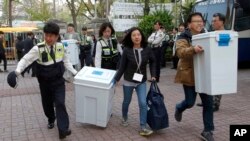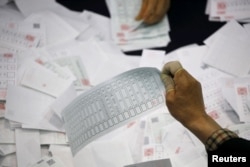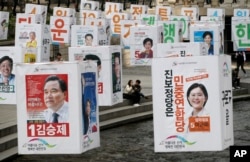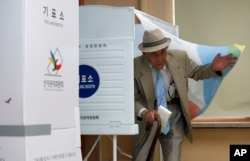Exit polls in South Korea indicate opponents to President Park Geun-hye’s conservative Saenuri Party are doing better than expected in Wednesday’s legislative election, and may deny the ruling party a clear majority in the National Assembly.
Recent polls had shown strong public support for Park, particularly for her tough stance on national security taken against the growing North Korean nuclear threat.
In this election the legislative body will expand to 300 seats.
While recent polls indicated Saenuri would win a clear majority, exit polls taken Wednesday show the ruling party falling short, and winning between 121 and 143 seats.
Main opposition
The exit polls taken by KBS television show the main opposition Minjoo Party of Korea, now taking between 101 and 123 seats, significantly more than originally projected.
Part of the main opposition Minjoo Party split off to form the separate People's Party for this election. Critics said the division among liberal groups would give conservative candidates a higher percentage of the fragmented field.
Instead the People Party is likely to do better than expected and win close to 41 seats.
Voter turnout was also was higher than in the two previous South Korean elections.
Misleading reports of low voter turnout did not include the more than 5 million votes, or 12 percent of the total, cast in early voting last week. These early voting ballots have not been incorporated into the exit polls.
Issues
Both opposition parties focused on the under performing economy, that grew 2.6 percent last year and youth unemployment that reached 12.5 percent in February, the highest since the government started keeping records in 1999.
“I judged that the majority party cannot resolve issues of inter-Korean relations and economy, so I voted for the opposition party,” said Kim Min-soo, a technician who voted for the Minjoo Party.
Many who cast their ballots for the conservative party were older voters and said national security was a key issue.
They expressed support for imposing increased sanctions on North Korea following Pyongyang’s fourth nuclear test in January, as well as cutting the last cooperative inter-Korean ties by closing the jointly run Kaesong Industrial Project, and increasing military readiness to respond to any provocations.
“I don't think Saenuri Party will lose over Kim Jong Un,” said Choi Jung-ja, who said she also liked the Saenuri Party candidate running in the district.
“South Korea must be stabilized. National security must be strong and stabilized. That's the most important thing,” said Park Hyun-ja, who voted for the Saenuri Party candidate.
Disillusioned voters
Heading into the election, there was a growing perception that none of the major parties were generating any public enthusiasm.
Some voters complained that the campaign was more personality driven and there were no significant new policies alternatives developed to challenge the status quo.
“There were many policies in the previous elections but there was no policy which differentiates this election,” said Kang Joon-yong, a young father who said support for children and working parents were issues important to him.
But the exit polls show widespread voter frustration over both the sluggish economy and the tense national security situation.
Rather than showing a strong endorsement for President Park this surprising election result will likely increase the power of her political opponents in parliament.
Youmi Kim in Seoul contributed to this report.








